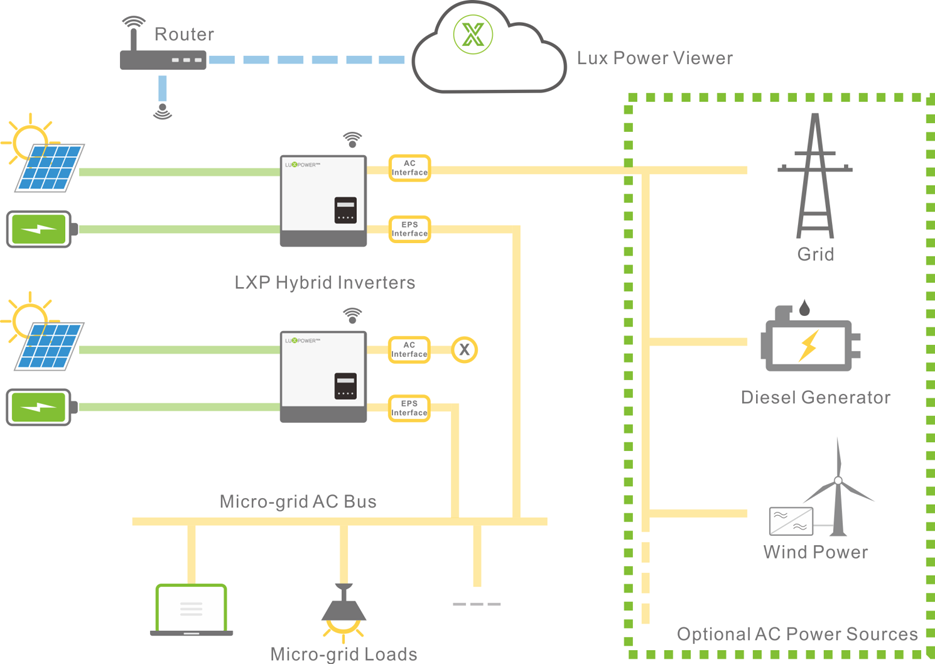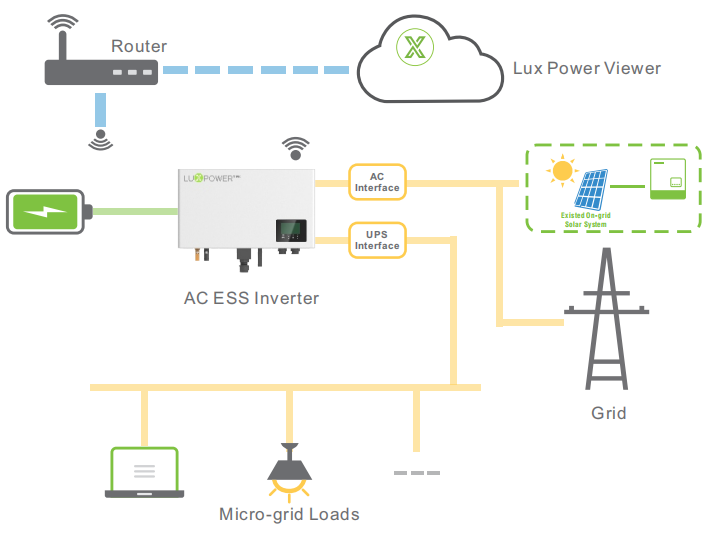Lors de l'achat d'un système solaire, il existe trois grandes options : les onduleurs hors réseau, les onduleurs raccordés au réseau et les onduleurs hybrides. Nous devons choisir un système approprié parmi ces options. En effet, chaque type de système a ses avantages et ses inconvénients. Le choix d'un onduleur solaire approprié peut avoir un impact considérable sur l'efficacité de l'équipement, les coûts d'installation, etc. Examinons maintenant les onduleurs solaires hors réseau et les onduleurs solaires connectés au réseau.
Onduleur solaire raccordé au réseau et hors réseau

Onduleur solaire hors réseau
Un onduleur hors réseau est, comme son nom l'indique, un onduleur solaire hors réseau, ce qui signifie qu'il fonctionne seul et ne peut pas fonctionner avec le réseau. L'onduleur solaire hors réseau tire l'énergie de la batterie, la transforme du courant continu en courant alternatif, puis la restitue sous forme de courant alternatif. Dans un système hybride, l'onduleur hors réseau peut être utilisé pour créer le réseau. Ensuite, pour faire fonctionner la majeure partie ou la totalité de l'électricité, il faut utiliser un onduleur relié au réseau.
Avantages des systèmes solaires hors réseau.
- Complètement indépendant du réseau et peut être installé dans des endroits où l'accès au réseau électrique n'est pas possible.
- Dans certaines régions éloignées, les systèmes solaires hors réseau peuvent être moins coûteux que l'extension des lignes électriques.
- Les systèmes solaires hors réseau sont autosuffisants en énergie et les coupures de courant sur le réseau électrique ne les affectent pas.
Inconvénients des systèmes solaires hors réseau
- Ils coûtent plus cher
- Les batteries doivent être alimentées en permanence, de jour comme de nuit.
- Peut nécessiter des changements de mode de vie pour réduire la consommation d'énergie
- Peut gaspiller l'excès de production d'énergie
- La nuit ou par temps couvert, vous ne pouvez pas compter sur le réseau.
- Les batteries nécessitent un entretien, ont une durée de vie relativement courte et se dégradent rapidement.

Onduleur solaire raccordé au réseau
Les onduleurs connectés au réseau sont conçus pour être reliés à l'alimentation électrique principale de votre maison afin de la compléter. Lorsque l'énergie solaire est disponible, le système alimente vos appareils. Lorsqu'il n'y a pas assez d'énergie pour tout le monde, le système revient à l'alimentation du réseau.Les onduleurs connectés au réseau travaillent avec la source d'énergie pour fournir autant d'énergie que possible. Leur conception intelligente permet de savoir quand l'énergie est fournie et quand elle ne l'est pas, et de synchroniser la fourniture d'énergie avec l'alimentation du réseau.
Avantages des onduleurs solaires raccordés au réseau
- Les systèmes d'onduleurs solaires raccordés au réseau permettent d'économiser de l'argent car ils ne nécessitent pas de batteries ni d'autres équipements.
- Possibilité de vendre l'électricité excédentaire aux services publics pour obtenir des revenus supplémentaires
- Coûts d'installation réduits, pas d'entretien ni de remplacement, efficacité accrue
- Le comptage net permet à l'énergie produite par le système solaire de compenser l'énergie utilisée par le réseau la nuit ou par temps nuageux.
- Peut obtenir une alimentation de secours à partir du réseau électrique pour éviter les coupures de courant soudaines.
Inconvénients des systèmes de convertisseurs solaires connectés au réseau
- Votre système relié au réseau s'arrêtera automatiquement en cas de panne du réseau et se remettra en marche lorsque le courant sera rétabli si une panne du réseau entraîne une perte d'électricité.
- Pas totalement indépendant du réseau
Comment fonctionne un système de convertisseurs solaires raccordés au réseau ?

Un système relié au réseau fonctionne en permettant aux panneaux solaires (via un onduleur) d'alimenter votre maison. L'onduleur solaire se connecte au réseau local de distribution d'électricité. L'onduleur solaire alimentera la charge de votre maison jusqu'à ce que la demande d'électricité dépasse l'offre. Vous devrez alors acheter un certain nombre d'équipements, notamment
Onduleur connecté au réseau :
Régule le courant provenant de vos panneaux solaires. Le courant continu fourni par vos panneaux est converti en courant alternatif utilisable par vos appareils. Un autre type d'onduleur que vous pouvez envisager est le micro-onduleur. Chaque panneau solaire est équipé d'un onduleur à l'arrière. Il peut augmenter la quantité d'énergie convertie vers chaque panneau. C'est une bonne option si vos panneaux sont souvent à l'ombre. Mais les micro-onduleurs sont bien sûr plus chers.
Compteur d'énergie :
Souvent appelé compteur net ou compteur bidirectionnel, cet appareil peut mesurer la puissance dans les deux sens, du réseau à votre maison et vice versa. Il permet de calculer l'électricité produite par les panneaux solaires ainsi que la connexion au réseau électrique. Parfois, votre fournisseur local en installera un gratuitement.
Comment fonctionnent les systèmes solaires hors réseau ?

Si vous souhaitez ou devez être totalement indépendant du réseau électrique local. Dans ce cas, une option solaire autonome qui vous permet d'être entièrement hors réseau est un bon choix. En d'autres termes, vos panneaux solaires vous permettront d'être entièrement autosuffisant en termes d'énergie. Cette énergie sera transmise de vos panneaux à un ensemble de batteries solaires qui passeront par un onduleur hors réseau et alimenteront directement votre maison.Si vous souhaitez installer ce système pour votre maison, vous devez installer certains équipements clés pour que votre système fonctionne en tant qu'unité. Il s'agit notamment de :
Régulateurs de charge solaire :
Également appelés régulateurs de charge, ces contrôleurs régulent la quantité d'énergie qui alimente les cellules solaires. Cela est nécessaire pour éviter d'endommager les batteries en les surchargeant. Un régulateur de charge approprié est essentiel pour maintenir les batteries en bonne santé et leur assurer une durée de vie maximale. Si vous disposez d'un onduleur à base de batteries, il est très probable qu'il soit équipé d'un contrôleur de charge intégré : Un groupe de batteries est essentiellement un groupe de batteries connectées. Il stocke l'énergie générée par le panneau. Un bloc-batterie est important, sauf si vous aimez vivre dans l'obscurité après le coucher du soleil.
Interrupteur de connexion DC :
Tous les systèmes solaires nécessitent des déconnexions de sécurité en courant alternatif et en courant continu. Pour les systèmes solaires hors réseau, un disjoncteur CC supplémentaire est installé entre le banc de batteries et l'onduleur hors réseau. Il sert à interrompre le flux d'électricité entre ces composants. Ce dispositif est essentiel pour la maintenance préventive, le dépannage et les incendies d'origine électrique.
Onduleur hors réseau :
Le régulateur de charge solaire et le banc de batteries reçoivent tous deux le courant des panneaux solaires. Celui-ci est finalement converti en courant alternatif par l'onduleur hors réseau. Celui-ci régule le courant provenant des panneaux et le convertit en courant alternatif pour que votre équipement puisse l'utiliser pour s'allumer.
Générateur de secours :
Si vous vivez dans un endroit qui n'est pas ensoleillé toute l'année. Vous devrez alors investir dans un générateur de secours. Les générateurs de secours produisent généralement du courant alternatif. Le courant alternatif peut être utilisé au moyen d'un onduleur ou converti en courant continu et stocké dans la batterie d'alimentation.
Conclusion
Pour la plupart des gens, un système solaire raccordé au réseau est un investissement sûr et prévisible pour leur entreprise, leur ferme ou leur maison. Un système solaire raccordé au réseau a un retour sur investissement plus rapide et moins de composants à remplacer à l'avenir. Les systèmes solaires hors réseau constituent une bonne alternative pour certains chalets et endroits plus reculés, mais ils ne peuvent pas rivaliser avec les systèmes raccordés au réseau en termes de retour sur investissement et de rentabilité.

